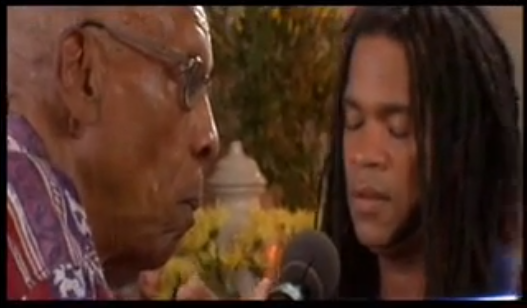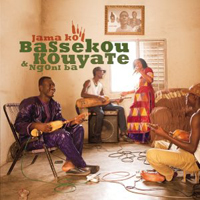
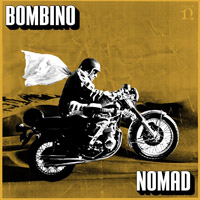
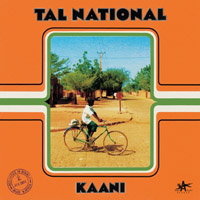
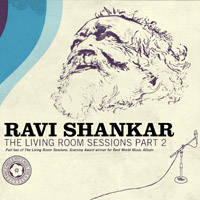
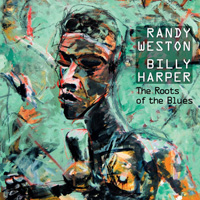
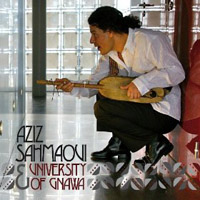
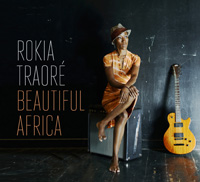
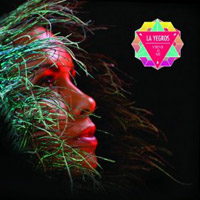
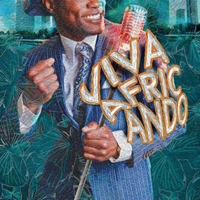
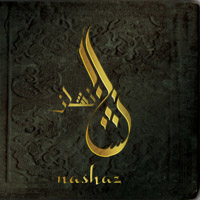
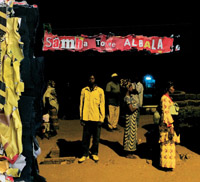
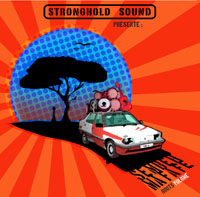
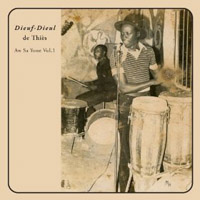
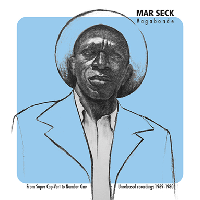
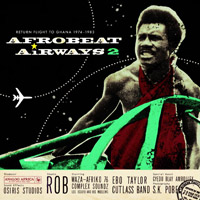
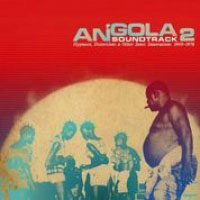
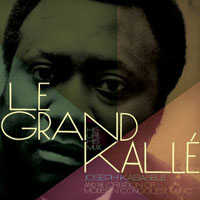
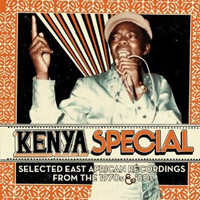
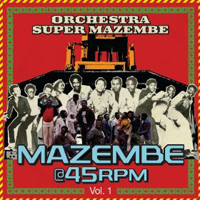
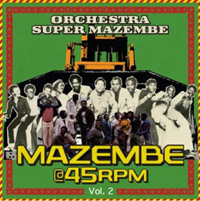


BASSEKOU KOUYATE & NGONI BA
JAMA KO (Out Here Records OH021CD)
This is only Bassekou Kouyate's third release but he further establishes himself as the foremost performer on the ngoni, the small Malian lute. The title, "Jama ko," means a big gathering of people, and his message is universal peace, but it also signals his approach to music: bring in lots of guests, to test them and his band (which consists of four ngonis plus percussion). The album was recorded in harsh circumstances: on their first day in the studio, in March 2012, the government was overthrown and the army took over. There were power cuts, fuel shortages, a curfew imposed, and the rebels began imposing Sharia law in the north of the country. Simply making music was a form of protest and so Kouyate and his team cranked it up. Ngoni Ba has changed and now, in addition to his two sons, includes a young ace on the ngoni named Abou Sissoko. The guests include vocalists Kasse Mady Diabaté and Zoumana Tereta who have sung with him before. Khaira Arby and good ol' Taj Mahal each show up for one jam, the latter does his credible imitation of Howlin Wolf (or is that his Captain Beefheart impression?). The Barr Brothers (unknown to me but that doesn't mean you've never heard of them) add drums and guitar and there are other rock elements overdubbed, none of them seriously detracting from the full-throttle thrust of the music. In fact the variety gives it a wider appeal: some folk might not sit still for an hour of traditional ngoni music, but when drums, rock guitar, and different singers turn up it's like a set from a very tuned-in deejay. If anything the guitarists recall the smoking jams of Lobi Traore who also performed with Ngoni Ba on their debut Segu Blue album.

BOMBINO
NOMAD (Nonesuch)
Having seen Bombino in concert and knowing how dynamic his guitar playing is, I bought this on sight, and was not disappointed. Forget the comparisons to Hendrix (okay so he's an African with occasional big hair), etc and just enjoy this as four on the floor boogying rocking music. Perfect to blast in your jeep as you hightail it into the desert. Bombino (Omara Moctar) kicks it off with a skirling rip on the Big Joe Williams' "Baby please don't go" riff, and then the band kick it up a key to show they are paying attention. It's big, it's loud, it sounds like it's being played live in a huge stadium. The progressions are familiar: "Her Tenere (In the desert)" is based on the "House of the Rising Sun" progression which you feel at home with, but there's that Toureg edge to the vocals. The sidemen are mostly his regular group of rhythm, bass and drums with the odd guest thrown in here and there. Now we no longer have Lobi Traore to blister our ears with his incendiary guitar work we are grateful to Bombino for filling the "Dartagnan of the Desert" role so admirably. Towards the end of the 40 minute set they get more into a trance-mode, even adding synth strings, but mostly it's stirring and occasionally screeching blues. Even when a song starts out quietly, it's not long before they get into fifth gear and floor it. There are two drum kits at work simultaneously (shades of Lobi T. who used two bassists!) and a pedal steel guitar shows up, memorably, with its mournful plaint, for the second half of the set.

TAL NATIONAL
KAANI (Fatcat Records FATCD126)
Tal National come from Niamey, Niger. It's a huge, landlocked impoverished chunk in the middle of the northern lobe of West Africa. There's no infrastructure, not much of anything there, so the band spend their free time at roundabouts hawking their own CDs. Now that's enterprising. But I suspect their world is about to change. This is a storming great CD and bound to catapult them to the world festival circuit. In fact, since signing to FatCat records, they have embarked on a US tour. Their music is trance-inducing, with sustained guitar riffs repeated over thrashing percussion (including tama or talking drum), and it is pretty intense. It's essentially African rock (like Bombino) but draws from Highlife, Soukous, Afro funk, desert blues and some traditional ideas. They call it "trad-moderne." They spent six years practicing before releasing their first album and now their discs sell out at home immediately. They also play dusk to dawn concerts five night a week in Niamey so have some powerful chops after a dozen years of performing together. Like OK Jazz they are so popular they created a reserve band of musicians who can fulfill gigs, in essence a clone of themselves, this way, like a soccer team, they can send on subs when the main players are starting to flag. I am sure that's where they got the idea, because the founder, Almeida, used to play football. He was also a judge for 20 years before starting the band; now he teaches music and drama at an orphanage in Niamey in his free time. You can hear a cut from this album, "Wongharey" on soundcloud, and decide for yourself.

RAVI SHANKAR
THE LIVING ROOM SESSIONS PART TWO (East Meets West Music, EMWM1009)
This may be the last new recording we get from Ravi Shankar, since he passed away shortly after recording it, at home in Encinitas, California, in 2012. Part One of these sessions won the 2013 Grammy for Best World Music Album (beating out his daughter Anoushka's latest), but Anoushka was there at the Grammies with Nora Jones to accept this, and a Lifetime Achievement Award for their late father. They joked about his profligacy and how he had "lost his Grammy" -- literally mislaid it. So they had called the Grammy office and asked if they could get a replacement. For which one? asked the receptionist. Turned out Ravi had won more than once but didn't know it. For fans of his music every album is a winner: he was a master of improvisation and whenever you listen to his music you never hear it the same way twice. Sometimes you might think he is pulling your leg, quoting "De Camptown Races" or another tune, then he flits off like a hummingbird to another musical source of nectar. Tanmoy Bose, longtime accompanist, is on tablas, and two of his devoted students, Kenji Ota and Barry Phillips, play the drone parts. Ravi is unusually vocal on here, scat-singing the rhythm, you can almost see him nodding to Bose, like "that's it!" The album seems quite short at 51 minutes, but Shankar is great for putting us into dream space. At the end he exclaims, "Oh, this was fun! Great fun!" Thanks for everything, maestro.

RANDY WESTON & BILLY HARPER
THE ROOTS OF BLUES (Sunnyside SSC3097)
Jazz is normally outside the purview of muzikifan. Not that I do not listen to it, in fact it's in heavy rotation, but because it is widely covered in other media and this site is dedicated to music of other "worlds." However when you consider that Abdullah Ibrahim is African, by birth, and that Pharoah Sanders (among many others) has played with African artists, you have to allow for genre-creep or some crossover in my column. Randy Weston is an American musician, however he was so enthralled with African music that he moved to North Africa 40 years ago and has produced several important suites of music incorporating African rhythms or instruments, including Volcano Blues, Marrakech in the Cool of the Evening, and The Spirits of Our Ancestors. While keeping a recognizable American feeling in his own playing (shades of Monk, Ellington, and a monster lefthand that really strides up and down to grasp big clusters of notes), Weston has also had a long and profitable partnership with American saxophonist Billy Harper. I saw them in concert six years ago and finally this year they recorded an album of three standards and ten of Weston's own tunes. Harper on tenor has a warmer and more mellow tone on this session than you'd expect from hearing his other work. Seems like he jumped on the Coltrane and even communes with the cetaceans on "The Healers," the longest cut here. Interspersed among the gems of Westoniana are "Body and Soul," "How High the Moon," and "Take the A Train," each of which points to a moment in Weston's own musical development. Clearly these guys are having a lot of fun in the studio, but they are working hard too. Harper and Weston first met in Tangier when Weston organized a jazz festival and invited the Max Roach group. Oddly Roach didn't make the trip and Weston ended up playing drums (!) behind Harper and the other members of the quartet. For The Roots of the Blues they decided to explore the darker tones of their instruments. Weston got hold of a Bosendorfer with extra low notes! "Blues to Africa" is based on the way elephants walk, he insists. Lagos and Dakar are also stops on the musical itinerary with "Carnival" which Weston wrote after visiting Bobby Benson's Caban Bamboo club in Lagos (and first recorded with Harper in 1974) and "Blues to Senegal," composed after hearing master percussionist Doudou Ndiaye Rose. One of my favorites is the atonal "Congolese Children's Song" which Weston wrote in 1963. Strangely enough he was gigging in the Berkshires and had plenty of time to listen to music, so was digging folkloric African albums which inspired this piece. How time flies, and it's hard to believe Weston is 87. This latest musical statement is an encapsulation and summation of many of his themes, a digest of his travels and a tour of his wonderfully diverse career.

AZIZ SAHMAOUI & UNIVERSITY OF GNAWA (General Pattern)
This album came out in 2011 but I've only just heard of it. Typically there are problems getting it from France to the US. Aziz Sahmaoui used to front Orchestre National de Barbès, which means, perhaps, we wont be hearing from them again (unless they found a new front man), however I play their En Concert and Rendez-vous Barbès albums a great deal. Sahmaoui's new group also features tar player Amar Chaoui, who used to be in Gnawa Diffusion, another expat band with a modern edge to their traditional sound. This hour-long offering is in the same vein as ONB: trancelike choruses, thwoking one-stringed instruments backed up by thudding bass, derbouka, clackety percussion. The set is half a dozen Gnawan traditional pieces which are spiritual in nature (songs used at holy rituals), plus half a dozen in the same vein by Sahmaoui, and a cover of Joe Zawinul's "Black Market." For the opener Sahmaoui substitutes an ngoni for the traditional guimbri. The Gnawan instruments are heard to great effect on the second cut, "Maktoube/Destiny (short version)," which creeps along insistently, with an almost whispered chorus, then Aziz breaks out with mad riffs on his little axe (mandola). There are lots of excellent soloists on here, and it strikes me as good as the ONB material, so I thought it was most of the same guys in a new guise. However I finally got a "real" copy of this disc and was surprised to find that there are no ONB members here. However, Sahmaoui, as lead string player, percussionist and vocalist was the outstanding personality from that group. Hervé Samb, a Senegalese jazz guitarist, is noteworthy (He has recorded with Pharoah Sanders, David Murray, Jimmy Cliff, Cheikh Tidiane Seck, Oumou Sangare, and many others). It's well sequenced: "Black Market" builds to a wild crescendo (Cheikh Diallo who plays keyboards also picks up a kora on this one), then we drop into a ballad, "Miskina," with Stefan Heckel on accordion. Things wind up to fever pitch again with ngoni, guitar and krakrebs on "Tamtamaki" which blasts off into the stratosphere. We return to "Maktoube" for the finale. This disc is a sure-fire winner.

ROKIA TRAORE
BEAUTIFUL AFRICA (Nonesuch)
Rokia has five or 6 albums under her belt now, but none are as consistently brilliant as her first two CDs, Wanita and Mouneissa on the Indigo label. They were sweet, beautifully sung and featured her guitar backed with balafon, calabash and ngonis. Touring and performing for over a decade has sharpened her delivery, given her a more rock sensibility, while moving back to Bamako from Belgium has refocused her on her own culture. Consequently most of her new album is top class, balancing her acoustic guitar with bass and drums and the odd interjection from ngoni. Her band is in top form, especially Mamah Diabaté, on ngoni (The others on the album are not in her touring band). They alternate between ballads and rockers, and the ballads have great rhythmic propulsion, nice space for the acoustic bass to come forward and the busy ngoni to embellish the medley. The weak spot is the title cut (despite a power riff that drives it) and the closer "Sarama," in which Rokia sings and raps in English, which is not her forte (despite the earnestness of her message). Sure, she is trying to reach out to a broader audience but people who like Malian music and enjoy listening to it don't care if they cannot follow the meaning. It helps when a song's synopsis is given, and indeed the booklet to this CD includes all the lyrics in English & French translation so you wont miss anything if you want to know. The song "Mélancolie" is in very understandable French, but her English is poorly enunciated and lacks the charm of say Björk's accent. It's funny to imagine her as lonely (the middle of 7 children) but she has moved all over the world with her diplomat father's postings and is caught between many worlds. She's an intelligent and insightful songwriter but her culture expects singers to come from certain social classes and families. She writes about birdsong in the early morning on "Tuit tuit," one of the delights here, and the production also heightens the mood of "N'Teri (Dear friend)," a reflection on the passage of time. Perhaps a spell in New York, Toronto or London would help her English, if that's where she wants to go with her singing, and a live album would broadcast her charismatic appeal to a larger audience.

LA YEGROS
VIENE D MI (ZZK Records)
Cumbia is still among the most happening music in the world and seems to have evolved in a very hip direction in the last couple of years. This got me moving from this first note. The singer, La Yegros, has a coarse street-wise delivery, a bit like Li Saumet of Bomba Estereo. Her backing is more organic with acoustic guitar, bass, percussion and accordeon, still, there are "effects" such as vocals interjected to resemble samples on echo, and a synth. There's also a Melodica which makes a nice addition and some African percussion instruments. It's classified as "electronica" and such effects kick in slightly on "Vagar" with deep floating bass and Melodica, but I think it would be better termed "Cumbia/dub." Co-writer of the music is the acoustic guitarist Daniel Martin on some songs, and keyboard/programmer Gaby Kerpel on others. But here's the boot in the booty: La Yegros is not Colombian! She comes from Buenos Aires, Argentina, though her music sounds more tropical, or should I say equatorial. She studied at the conservatory in Moron (no jokes, please) and lived abroad for 5 years before starting on this, her debut disc. There is a traditional Argentinian rhythm, the "Chamame," that has a loping beat like Cumbia, which features in her song "Trocitos de Madera (wood chips)." Another Argentinian, Miss Bolivia, shows up to duet on "Ya no Llorés." Miss Bolivia, who was on Cumbia Bestial, is a former psychologist, a rapper who mixes dancehall, reggae and hip-hop Latino. She lives in La Boca, a famous ghetto in Buenos Aires, and she lays it down hard on her guest toast. There's squinchy synth, solid bass, and a bright charango, which is that teeny 8-stringed instrument from Bolivia (all the backing on this track was laid down by Kerpel). The momentum builds, and while the title track is a sure hit, there are other stand-outs, including "Solo," and the closer "Que me hizo mal." This is an auspicious debut, to use a platitude, but that is apt in this case, and signals an important new voice on the Latin scene.

AFRICANDO
VIVA AFRICANDO (Sterns STCD1120)
What? -- the eighth Africando studio album, you gasp! What new ideas can they bring to this? I felt they fell off after their first couple of albums (21 years ago already), which were blockbusters, but actually they are right in the groove here. It's mostly the same sound you will know: polished ballroom salsa session guys from New York backing some soulful African singers. They're missing the late Gnonnas Pedro, and refer to him throughout, but the singers are in full throat and the glitterball is glinting. There's Amadou Ballaké, Medioune Diallo, Sekouba Bambino (the vocal star of Bembeya Jazz National), and Roger Shoubou (of Haiti's great Tabou Combo), from the core group on vocals, with added guest shots from James Gadiaga, Jos Spinto, Lokombe, Rene Cabral (from Cabo Verde), and Ray de la Paz with the Spanish Harlem Orchestra all taking turns on the mike! As usual, Boncana Maiga does most of the arranging. And once again the approach to the playlist is familiar: some of the singers' individual hits remade in a new and improved smooth style. They open with a quote from "Doni doni" by Bembeya Jazz, and you would think me remiss if I did not mention that this is an oblique "Peanut Vendor." Jimmy Gadiaga's "Xamsa bopp," a classic from Super Cayor de Dakar, is given the full treatment, even a strident tres solo! Pascal Dieng was also in Super Cayor (this is his second album with Africando) and another Senegalese singer, Bassirou Sarr (ex-Dieuf Dieul) also returns. Oscar Hernandez on piano is solid as is, of course, the swinging electric bass, the cornerstone of any tight salsa dura session. This was recorded in Paris: a good meeting ground for the two musical styles that diverged over the Atlantic and are now reunited. Actually the key player, arranger Boncana Maiga was in Mali when the civil war erupted and couldn't get a US visa but was able to travel to France. The recording is crystal clear, the pots are hot and you can hear every chomp of the guiro, every trill on the bongo, every timbales trinkle, every brassy bomp. "Es para ti Gnonnas" takes the late vocalist's "Von no no no" riff and spins it out as a montuno, with fellow Beninois Jos Spinto taking the lead. And in fine Africando tradition we have singers dying on us. This time it's Raymond Fernandez who recorded "Destino" for the last album Mandali before pegging out, so it has been added in here to remind us of our mortality. Now, it's not all Senegalese salsa: as you know many African countries created their own versions of the Latin beat, and we get a lovely rendering of Ntesa Dalienst's classic rumba congolaise "Maria M'Boka" sung by Lokombe Nkalulu (who was with Dalienst in Les Grands Maquisards. For some reason the classic Maquisards tracks have never resurfaced on CD: you can find "Maria Mboka" on Sonodisc's Merveilles du Passé 1968 1969 [LP 360 155]). Dieng's "Yen Djiguengny" is another son montuno, and seems to be based on "Como esta Miguel" by Sexteto Habanero, but how come I don't have any Super Cayor albums?! They must have recorded at least one. However, the real surprise is still ahead and it arrives suddenly and so inevitably you wonder how it didn't happen before. I am talking about a medley titled "Noche con Santana," that features the hits of our very own Santana: "Samba pa ti," & "Oye Como Va" that segue into "Black Magic Woman." (Yes I know "Oye como va" was written by Tito Puente and Peter Green wrote "Black Magic Woman," they are still identified with Santana who had the bigger hits with them.) Things change up again when electric guitar enters, not for the Santana cut, but for the last Africando track "Bouré Yayé Diama," which then segues into the more familiar guiro, bongo and horn attack. Then we get a guest shot, the redoubtable Spanish Harlem Orchestra perform "Africa Es," which is their tribute to and medley of Africando. Africando deliver abundant surprises and enough heat to warrant your attention once again.

NASHAZ
NASHAZ (Ziryab Records/Nashazmusic)
This is my new go-to disc when I want an hour of mellow instrumental music -- which is quite often. From the cover you'd think "Arabic," and it does have the Arabo-Andalusian sound, with lute and the little ceramic hand drums, even some Arabic-sounding flutes, but there are also what I would classify as jazz musicians on here playing sax and trumpet. And Arabic modes (the maqam) lend themselves well to freeform improvisation on brass. Nashaz is the brainchild of Brian Prunka, a guitarist who heard the oud and was hooked. (The story is an Egyptian taxi driver in New Orleans told him he ought to check it out!) I have to confess I really don't like jazz guitar. I don't mean Django or the early guys, but post-Charlie Christian jazz guitar turns me off. The oud on the other hand I can take in any quantity. Early on (before we even knew we were listening to "world music") I got Hamza El Din's brilliant album, Escalay: the Water Wheel (Nonesuch, 1971), and later on I discovered he lived in Berkeley (a lot easier on the constitution than Sudan) so I got to hear him perform in intimate small settings. Prunka studied with Simon Shaheen and moved to Brooklyn (from New Orleans) to pursue his music. The name of the group is an in-joke as "Nashaz" is Arabic for discordant or out-of-tune. Kenny Warren on trumpet has played with Slavic Soul Party and has studied Balkan and Turkish music before getting into the maqam mode. He does those little Milesian squeaks, then pops in the mute for a sustained out-breath. Nathan Herrera on alto sax, flute and bass clarinet has studied Indian as well as Macedonian music, he brings a great ear to the session -- I dig his warm bass clarinet sound a lot. Apostolis Sideris on the bass is the Greek contingent (No, it's not the Mothers of Invention: there's no Jimmy Carl Black!). George Mel on percussion is a jazz drummer from Tbilsi, and Vin Scialla, who is also listed as percussionist, is another jazz and world music guy with a track record. So they have a wide range of backgrounds and a focus on this mode that is exciting and really works as jazz or Arabic music, wherever you fancy filing it. It's got under my skin: I am eating cucumber salad and drinking mint tea!

SAMBA TOURE
ALBALA (Glitterbeat GB004 CD)
Now for something completely mellow, or so it seems on the surface. Samba Touré was a member of Ali Farka Touré's band and this is his third album under his own steam with his talented sidemen Djimé Sissoko on n'goni, and Madou Sanogo on congas and djembe. Samba plays electric guitar which makes a nice counterbalance to the quirky banjo-like tones of the n'goni. If you are missing an Ali Farka fix this will do the trick: it's very reminiscent of the great man's recordings. Samba Touré is from Northern Mali and sings in Songhai. As you know Northern Mali is where the deal is going down: fundamentalists, who snuck in from the sands of Libya, are attempting to impose Sharia Law and we know what that means: no music, no education for girls, lots of amputees at the whim of militias and bullsh*t-artists who call themselves Men of God: these evil unwashed pimps even destroy sacred texts in order to keep everyone in ignorance. This is not restricted to Muslims, it's endemic among all sons of Abraham and we must shun extremist Christians and Jews as much as these Muslim fakers. So the songs are dark and mournful, but since I assume you don't understand Songhai, it's like listening to Mississippi Delta blues at low volume. That is to say we love and enjoy Mississippi Delta Blues and even sing along ("With my 22-20, I'll cut that woman half in two . . ." etc) but we don't for one minute associate those lyrics with their true evil import! So I think you can listen to and "enjoy" these songs about Rapists, Thieves and Betrayers. There is also a special appearance by Zoumana Tereta who is the maestro of the one-horse-hair fiddle; he's appeared frequently with the Bassekou Kouyaté group. The album is also infused with atmospherics, courtesy of Hugo Race who is a member of The Bad Seeds (I've never heard of them, but presume more worldly folks have), subtle touches of sounds from synth and treated guitar. He is most noticeable on the last cut, "Bana," which is really trippy with an insistent ominous guitar phrase that draws you in.

SEMBEH MA FA FE (ROOTS VOLUME) (Stronghold Sound)
Here's some tribal music from Guinea, some of it raw and ready, some of it remixed with dubby bass 'n' drums by the likes of Captain Planet, Chief Boima, J Boogie and Dub Snakkr. The scorching Captain Planet remix of "Tounkan" posted on soundcloud caught my ear and made me want to check out the rest of this. It's a traditional piece with djembe and balafon and a woman (Saran?) singing. The remix is looped with an overdubbed syn bass and drums, to give it more disco-oomph. (Though the vocals have not been treated.) Dub Snakkr, the man behind the label, has recently done some exploration of post-revolutionary Arabia (Arab HipHop in the Wake of Revolutions) and while he was on the continent he returned to Guinea looking for old and new artists for the label's first all-African release. The dozen traditional sides are great; the four remixes come halfway through and fit in nicely. I am no purist: I like to hear white rockers jamming with Africans (if they are good). I know the planet is shrinking but I manage to block out everything that bugs me about contemporary pop music (I just discovered Eminem is white! I still don't know his music and I am sure I don't want to: I should have guess his ethnicity from his name but I try not to notice. Wait, the Beastie Boys are white too? I really have got this hippety hoppity thing all wrong then.) Anyway the return to the traditional stuff is good because then you notice the ferocity of the balafon and drums (and djembes) and realize you don't really need the added dub stuff to enjoy this, it just makes a nice change and spices up the proceedings a bit.

